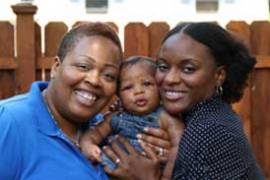
Religious Exemptions 2015: Love, Honor, Cherish in the Year of Nooooo!
Blog Search
Two years ago, with the pace of marriage wins accelerating nationwide, our opponents supercharged a favorite tactic in their continuing efforts to deny equal rights to LGBT people and those living with HIV—misusing religion to justify exclusion.
In early 2015, as the U.S. Supreme Court announced it would hear arguments in Obergefell v. Hodges and the potential demise of marriage bans became an increasing reality, those efforts increased exponentially. From eight bills introduced in state legislatures in 2013 (six of which were defeated), and 15 in 2014 (14 of which were stopped), 2015 saw the introduction of at least 80 bills in about half of the states, eight of which proved unblockable in the end.
Not all of these bills sought to inflate religious rights. But, they all did seek to facilitate discrimination against LGBT people and those living with HIV. And they all underscored what we in the movement have long maintained – winning marriage would in no way end the struggle.
The March battle in Indiana quickly became the highest profile state legislative fight of 2015, with national media and the general public paying keen attention. But it was a battle many of us had seen coming, especially after the U.S. Supreme Court’s 2013 Hobby Lobby ruling extended religious rights to many corporations. And Indiana eerily echoed what had played out in Arizona in 2014, where hasty state legislators embraced a grossly overbroad religious rights bill that, as a practical matter, encouraged discrimination, and where corporate leaders and major sports organizations joined with LGBT advocacy groups in vocal opposition, understanding too well the harm it would do. The difference between Arizona and Indiana, of course, is that Arizona’s then-governor, Jan Brewer, listened to the broader community and vetoed the bill. Indiana Gov. Mike Pence showed no such caution for his state’s reputation, and the blowback was immediate and has been lasting.
But Indiana was only the most visible of the year’s many insidious efforts to use religion to perpetuate discrimination. In far too many places, 2015 could be called the “Year of Noooo!” Across the country, state legislators scrambled to pass scores of bills in anticipation of Obergefell, including at least a dozen bills in Texas alone.
The roughly 80 state bills included: (1) so-called “religious freedom restoration acts” (RFRAs) with varied particulars; (2) unprecedented permission for public employees, businesses, and publicly funded agencies to refuse marriage-related services, child welfare services, and health services; (3) new rules to allow public school student groups to discriminate; (4) guarantees that those receiving public funding may discriminate; and (5) preemption of local civil rights laws. And in state after state, bill sponsors’ rhetoric made plain the disdain for gay and transgender people that still permeates much of the country despite majority support for marriage equality.
And the Year of Noooo! took other forms as well. Some government officials charged with enforcing the law and providing essential public services refused. Roy Moore, the infamous Chief Justice of the Alabama Supreme Court, ordered all probate judges in the state not to issue marriage licenses to same-sex couples, flouting a federal court order. Post-Obergefell, Texas Attorney General Ken Paxton instructed state officials not to issue birth certificates identifying same-sex parents of adopted children, or death certificates recognizing same-sex spouses of decedents. And, of course, who can forget Kim Davis, the Clerk of Rowan County, Kentucky, and her insistence that she not be expected to do her job and issue marriage licenses to same-sex couples given her Apostolic Christian faith?
In states and municipalities across the country, we at Lambda Legal have joined with our sister advocacy organizations to create highly motivated, on-the-ground coalitions with community, corporate and political leaders determined to stop these anti-LGBT attacks. And in most cases we have won, and have further increased public awareness of this problem in the process. But some attack bills have passed, and even with our fairly good success rate, it’s critical that we not be complacent as the coming year approaches.
Those fixated on maintaining rights to discriminate have not given up. To the contrary, in some states, they already have pre-filed appalling bills for the 2016 legislative session. In others, the statehouse hallway chatter includes audaciously radical proposals. The implications are profound for the quality of life for LGBT people and families if any of these pass as proposed.
The fact remains, if religious rights to reject others extend into the realm of commerce, planning a wedding or other celebration can become a gauntlet of refusals and humiliation. Our public malls and shops will become overtly segregated, as couples need to chart a path among florists, bakers, managers of public venues, and others to find those willing to serve “their kind.” Our society would be resuming exclusionary practices it has taken decades to repudiate with respect to race, ethnicity and religion, and that still persist on those grounds far more than usually is acknowledged.
And just consider the implications in other areas where the services in question can be a matter of survival and are provided with public funds by religiously affiliated entities that claim doctrine-based rights to discriminate against LGBT people. These can include health care services, nursing and rehabilitative care, substance abuse recovery, child rescue and placement services, homeless services and family crisis counseling. Those in the most vulnerable of circumstances must not be made more so – and deprived of their essential dignity and equality – based on others’ religious convictions.
Looking back on 2015, the year’s state-level RFRA battle can be seen as bookended by Indiana. The March controversy ignited broad public alarm and, last month, Indiana legislators wrapped up the year by introducing a new bill for 2016 ostensibly to repair the reputational damage. But, while touted as adding sexual orientation and gender identity protections to Indiana law, the bill should be recognized as a wolf in sheep’s clothing. It includes provisions to create religious refusal rights even broader than those enacted against outrage in March, together with new, unprecedented anti-LGBT exemptions that, for example, would allow employers to dictate what clothes their transgender and gay employees can wear and which restrooms they can use.
As we saw from the grotesque tactics that deceived voters into rejecting the Houston Equal Rights Ordinance (HERO) last month, catering to anti-LGBT prejudice opens doors to extremism. It is essential that we launch 2016 remaining staunch against efforts to create religious carve-outs, to expand beyond all recognition what religious freedom really means, and to turn civil rights laws perversely into tools for discrimination.
Please join Lambda Legal today and help us continue the fight for equality in 2016! Your gift will be matched dollar for dollar by the $1.25 million matching challenge from the estate of John Barham and Dick Auer.




